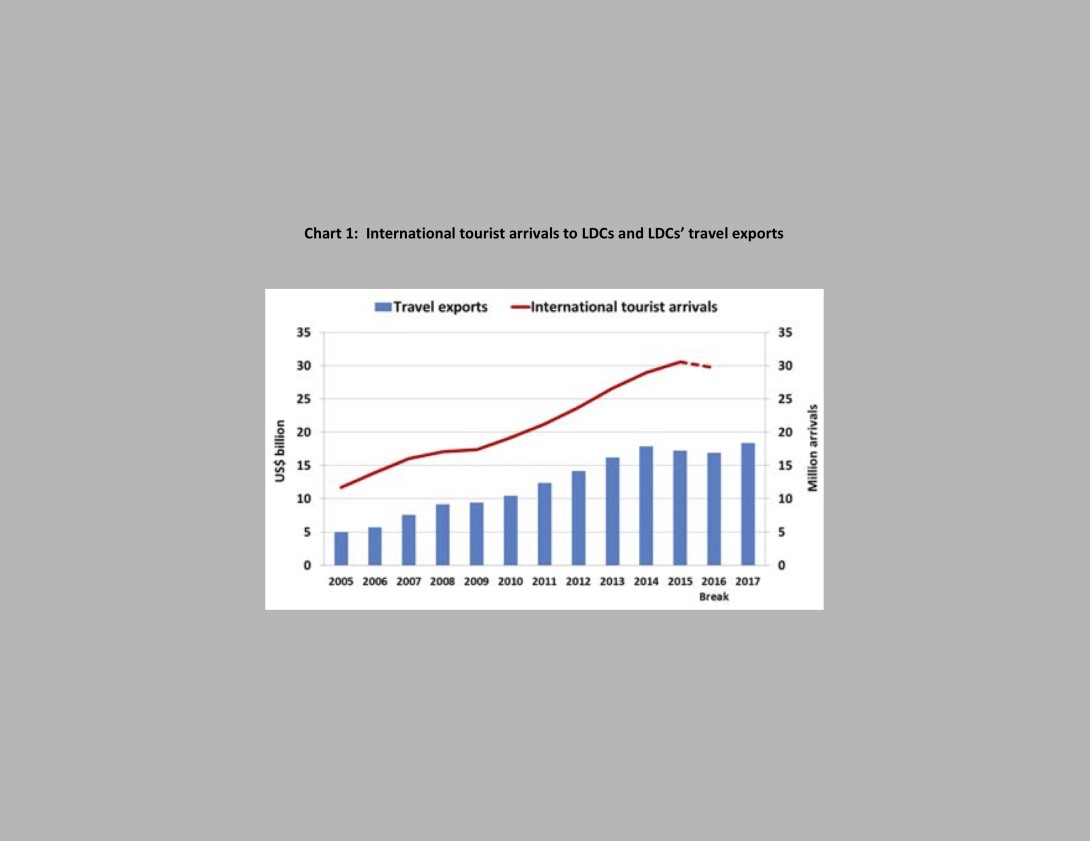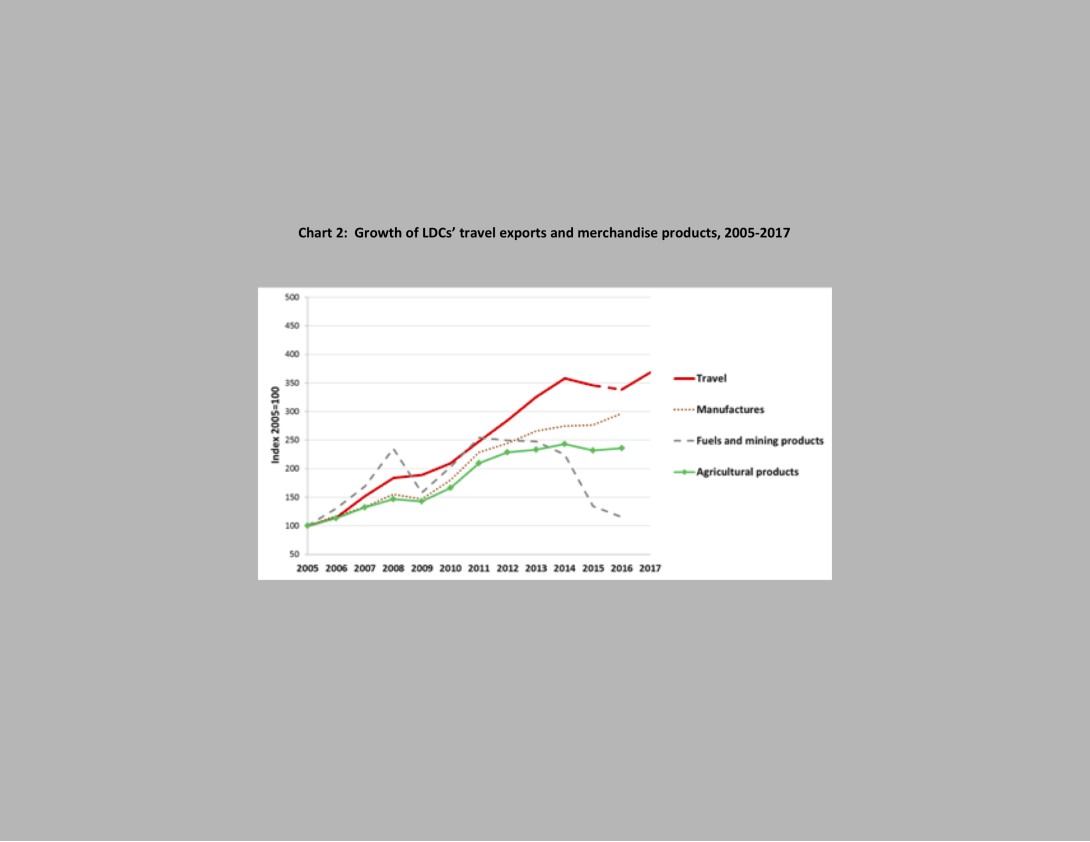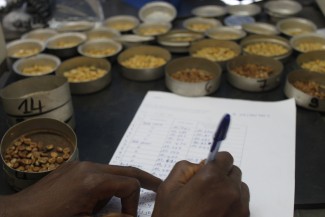To transform LDCs, turning tourism into new kinds of growth
The role and significance of the manufacturing sector for economic development is well established. At the early stages of development, manufacturing and industry-related services can act as true engines of development due to their potential to generate high economic growth, strong direct and indirect employment, good wages and rapid productivity enhancements. This explains why manufacturing is so important for structural transformation – especially for the Least Developed Countries (LDCs).
LDCs remain on the margins of industrialization and most notably in Africa, as evidenced by key indicators such as the share of manufacturing value added (MVA) in GDP and MVA per capita, which are lagging significantly behind developing country averages. Tiny shares of manufactures in total LDC exports, as well as the high degree of product concentration, further point to the urgent need for economic diversification and structural transformation.
At the same time, international tourism, or “export tourism”, has a footing in many LDCs, and continues to have excellent growth potential. The Enhanced Integrated Framework (EIF), the World Tourism Organization (UNWTO) and the International Trade Centre (ITC) noted in the 2017 Tourism for Sustainable Development in the Least Developed Countries: Leveraging Resources for Sustainable Tourism with the Enhanced Integrated Framework that tourism is a crucial growth sector, stating, "Tourism is widely recognized as a key sector for achieving the United Nations Sustainable Development Goals (SDGs), given its major potential to contribute to jobs and wealth in the developing world."
TRADE IN TOURISM
Tourism's export performance in LDCs has indeed been impressive (see Chart 1). The World Trade Organization (WTO) in its World Trade Statistical Review 2017 notes that tourism's export growth rate in LDCs since 2005 has been significantly higher than for other major sectors (see Chart 2). Indeed, while the LDC share of global merchandise exports in 2017 was only 0.95%, and for commercial services overall 0.6%, the share for international tourism, or “travel exports”, was significantly higher at 1.4%.

Tourism is highly labour-intensive, offering numerous opportunities for decent employment, entrepreneurship and advancement, including for women and youth, those living in rural areas and for SMEs. Whereas manufacturing in many LDCs tends to cluster, for example in Special Economic Zones near urban areas, tourism typically occurs in remote and rural areas that otherwise have few economic alternatives.
At a practical level, for example, quality urban hotels, restaurants and other tourism-linked facilities are essential to international business success, as well as for attracting and retaining foreign direct investment.

NICE NETWORKS
Tourism's existing supply and distribution networks can be used to help grow domestic and regional manufacturing. Rather than initially chasing complex and constantly changing markets abroad, LDC manufacturing investment should first attempt to satisfy existing needs, including the large and rapidly growing national and regional-level tourism markets.
Regional approaches to investment in tourism-related light manufacturing could help achieve the necessary economies of scale to become more competitive with imported suppliers. This, in turn, could provide support for on-going efforts for regional trade liberalization and trade facilitation.
All LDC tourism enterprises require constant supplies of manufactured inputs, much of which is currently imported. Consequently, the supply chains are already established, stable and highly predictable in terms of both existing and future demand. As mentioned, applying dynamic comparative advantage could lead to steadily increasing levels of domestically manufactured tourism inputs, with the added benefit of increasing technological capabilities for further economic development. Instructive in this regard is the role that Joseph Stiglitz ascribes to external demand as a temporary mechanism to compensate for underdeveloped domestic markets, giving local firms the space to develop productive and technological capabilities.
It is important to note that tourism also provides extensive opportunities for the development of domestic services capacity due to high demand for such inputs as marketing, finance, construction, architecture and engineering services.
OPEN FOR OPPORTUNITIES
UNIDO and other international organizations recognize the linkages between tourism and agribusiness; the next step is to link tourism to overall manufacturing.
The 2016 UNIDO report to the G20 Development Working Group, Industrialization in Africa and Least Developed Countries, states, "By linking tourism and culture with agribusiness, high value added can be created generating social and economic returns such as innovation, diversification and jobs, especially in rural areas." To date, however, few development projects appear to focus on tourism and manufacturing directly.
Existing UNIDO projects include work in Tanzania to identify linkages between horticulture producers and processors and local hotels and restaurants with the goal to increase local production and to supply high-value agro-products, including organic items. UNIDO is also helping Haiti to develop agro-value chains and inclusive and sustainable tourism by creating a craft village to connect creative industries and agro-value chains, and offer new skills.
Insights from EIF's support to LDCs confirm the important potential and existing contributions of the tourism sector to economic growth and job creation in LDCs, particularly for women and youth. Many LDCs have adopted a value chain approach in developing tourism, but the development of strong linkages has been mostly limited to sectors such as transportation, accommodations, handicrafts, food, leisure and cultural services, rather than backward linkages to manufacturing.
Local sourcing is still very limited to food supply and is below potential levels. EIF’s Tanzania Diagnostic Trade Integration Study Update in 2017 showed that while 22% of all tourism spending in Tanzania is for food and beverages, only 60% of produce sold to the tourism industry is being sourced locally. Notwithstanding other inputs, the tourism sector especially offers an important growth opportunity for the food and beverage industry.
THE ANSWER IS "YES!"
The answer to the question in the title of this article is obvious. The major importance of manufacturing development for LDCs is widely agreed, and the benefits of tourism exports are also apparent. What is missing are clear strategies to create and develop the linkages, and to come up with synergistic approaches.
For this, a change in mind-set is required, meaning rather than solely focusing on expanding the cross-border exports of manufacturers, LDCs must also consider domestic and regional tourism markets as a stable and rapidly growing base for further expanding manufactured exports.
-------
Dale Honeck, Senior Counsellor, Trade in Services and Investment Division, World Trade Organization.
Frank Van Rompaey, Representative to the UN and other international organizations in Geneva, United Nations Industrial Development Organization.
Hang Tran T.T., Senior Coordinator, Executive Secretariat for the Enhanced Integrated Framework at the WTO.
If you would like to reuse any material published here, please let us know by sending an email to EIF Communications: eifcommunications@wto.org.



